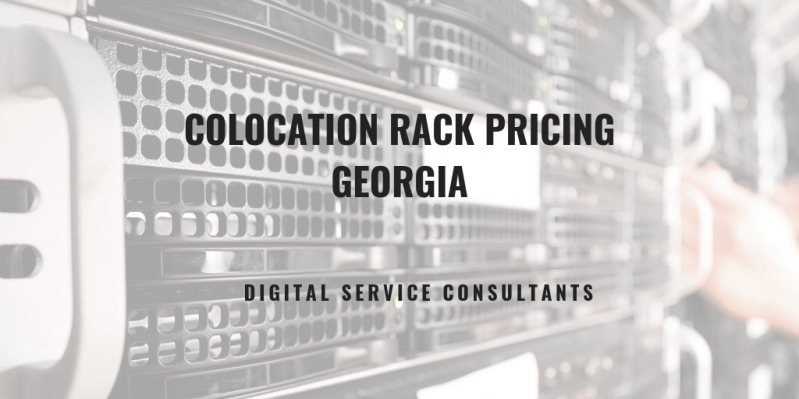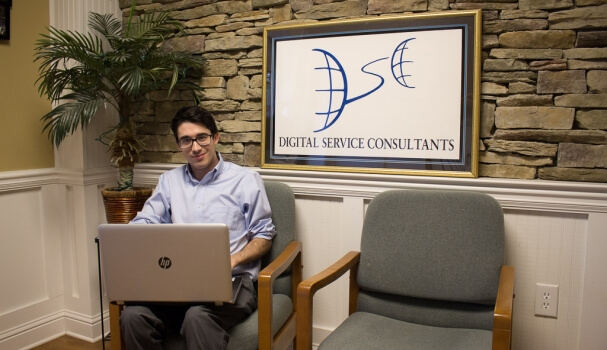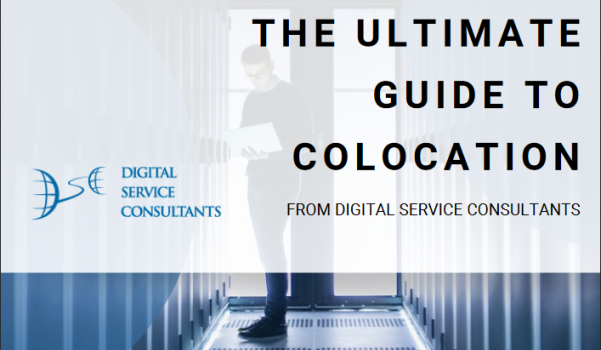Finally, here’s an article that will help you better understand colocation (colo) and colocation rack pricing, so you can make the best choice for your business. Once you have that understanding, get the best colocation services in the Atlanta, Georgia area.

What Is Colocation and Why Do You Need It?
Server colocation is when you rent space in an offsite data center for your servers. The data center is specially equipped to safely store and maintain your equipment for you. It takes away the need for your business to set up a costly IT department to house and maintain its own servers. You can visit your equipment and access it at any time; it is still your property, but you don’t have the high cost of maintaining your own facility that can safely keep your servers.
Colocation, also known as colo, can be a great way for you to save money on IT costs while providing a safe and secure environment for your sensitive data.

Colocation lets you rent space in a data center to store your company’s servers
Colocation Rack Pricing
There is a wide range of colocation rack pricing out there, and when you first start looking, you may wonder why. The lowest price doesn’t always mean the best value, however, and the lowest price may not offer you the right kind of service that your business requires. The following is a breakdown of how colocation rack pricing is determined and the different components that will affect the price that you are quoted.
1. How Much Rack Space You Require
Probably one of the biggest factors in determining colocation rack pricing is the amount of space that your servers will take up in the data center. Your servers will be stored on racks at the colocation site. The price that you are quoted will take into consideration the square footage that your servers will take up.
Both the width and depth of your servers need to be accommodated. If you have equipment that isn’t a standard size then it may need to have a customized rack which will add to the cost and the time to set it up. The unit of measurement used when talking about rack space is “U”, which is equal to 1.75 inches in height. A piece of equipment that is 3.5 inches high would take up 2U of rack space.
A typical full-sized rack cage found in data centers is 42U high and either 19 or 23 inches wide. The individual pieces of equipment held on these racks are usually anywhere from 1U to 4U high. Most rack-mount servers take up 1-2 Us of space.
To learn more about rack sizes and pricing, you can read our article “Colocation Pricing: The Definitive Guide on What to Expect (2019 Report).”

Your colocation pricing will be affected by the amount of space your server takes up – Image Source: Wikipedia
2. Keeping Your Servers in a Safe Environment
Another large factor in colocation pricing is the cost of keeping your servers in an appropriate environment. Servers generate an incredible amount of heat. Keeping them cool and at a constant temperature is very important for keeping them maintained properly. Having constantly monitored HVAC system installed for your business would be very costly. Colocation allows that cost to be spread among all of the tenants of the data center, thus bringing it down for everyone.
3. The Choice of Different Maintenance Packages
Some data centers will provide you with a choice of maintenance options. You can choose to do all of the maintenance of your hardware yourself or you can pay an additional monthly fee to have staff at the data center do it for you. Simple maintenance tasks such as flipping a switch as necessary may be included free of charge in your service package whereas more complex maintenance will probably cost more.
 You may choose to pay extra for additional maintenance services
You may choose to pay extra for additional maintenance services
4. The Type of Connectivity You Require
Most data centers will offer you high-speed internet access. It could either be included in the colocation price or it might be an additional cost. If you need high-speed connectivity for mission-critical workloads, you may have to pay extra.
5. How Much Bandwidth You Require
With colocation, you will need to access your servers from your business location. This means that you will need enough bandwidth to be able to do this quickly and easily. Depending on how you use your servers and how much traffic needs to access the data, you may need a considerable amount of bandwidth. This will affect the final price that you pay.
A good colocation provider will talk with you ahead of time to better understand your requirements and determine how much bandwidth you will need before you move your servers over. This will facilitate your move and ensure that you will have limited disruption in your operations.
 The amount of bandwidth you require will also affect the cost of colocation
The amount of bandwidth you require will also affect the cost of colocation
6. The Power Needed for Daily Operations and Redundancy
Not only will you save money on power costs with colocation, but your provider will also have a redundant power source that will kick in if there is a power outage. This additional power will be factored into the price that you pay, however, the cost is worthwhile as downtime always costs you money in lost sales and lost time.
Installing a redundant power source at your own place of business would be very costly, but at a colocation facility, you share the cost with the other tenants.
7. A Secure Facility
You probably won’t see a separate charge for security in your colocation pricing, but when you are choosing between providers, you should take a look at the security options they provide. Your data is sensitive and you want to make sure that the location you decide on has proper physical security features in place.
 A colocation facility located in the suburbs will cost less than one in a city center
A colocation facility located in the suburbs will cost less than one in a city center
8. The Location of the Data Center
The location of the data center will also affect the price that you pay. A colocation facility that is located in a major downtown center will most likely cost much more than one that is located outside of a city center. This is because real estate costs more in a downtown location than it does is a suburban or rural one. If your business is located in a higher priced area, then it makes sense to locate your servers in a less costly area to reduce your real estate expenses.
9. The Level of Technical Support
The level of technical support provided with your colo package will affect the price as well. Find out if the pricing includes 24/7, live, technical support and if the center is fully-staffed around the clock. You may find that support is an add-on service.
Is Colocation Right for Your Business?
Find out if colocation is right for your business. Click here to download your free copy of “The Ultimate Guide to Colocation”

You Can Trust DSC for Secure Colocation, Cloud, and Internet Services
Digital Services Consultants is a premier data center located just outside of Atlanta, Georgia in Buford, that offers you the safest IT solutions possible. Along with our top-notch server colocation, we provide a full range of internet- related and cloud services including cloud backup, system monitoring, software hosting, dedicated email, website development and implementation, web hosting, e-commerce, security, and a variety of related products and services.
We also provide network support for Linus, Microsoft server and workstation platforms, Fortinet firewalls, and Cisco Systems. DSC has been a trusted name in the IT industry in Atlanta for more than 30 years. Contact us today for all of your internet-related requirements.
Learn how the “Super Heroes of IT” can help you maintain a reliable connection and computing infrastructure
“Ashia R. Was extremely helpful and patient while working on everything. Always very knowledgeable and precise! This company is literally the best option out there! Top Notch customer service and actual service! Thanks for everything!”
– T. Rivera
Read more customer reviews
 DSC has been a trusted name in the IT industry in Atlanta for more than 33 years
DSC has been a trusted name in the IT industry in Atlanta for more than 33 years
DSC Gives Back to the Georgia Community
DSC is proud to be part of a thriving Georgia community and we care enough about our community to want to give something back. That is why we started the “Next Generation” training days. During the training, our students learned about the history of CPUs and GPUs. The training focused on the performance and success of different models and brands and which ones excelled during their various time periods. You can access an audio recording of the training on the DSC website for free. Click here to listen!

